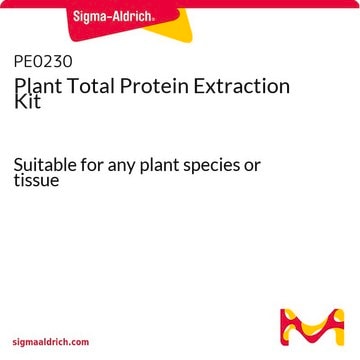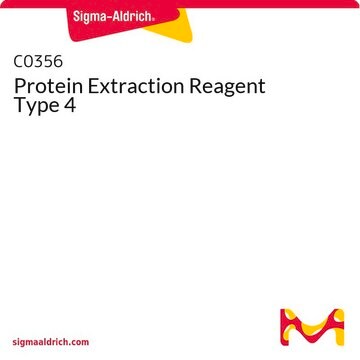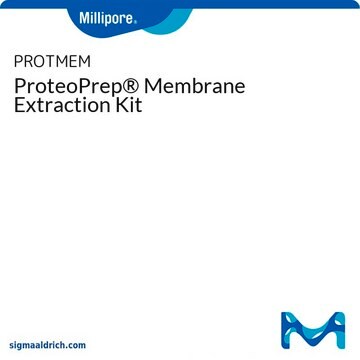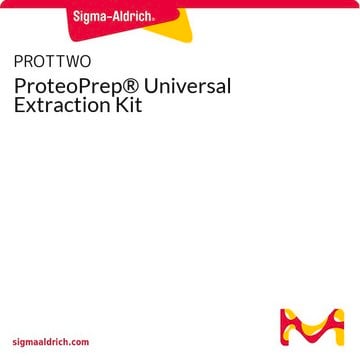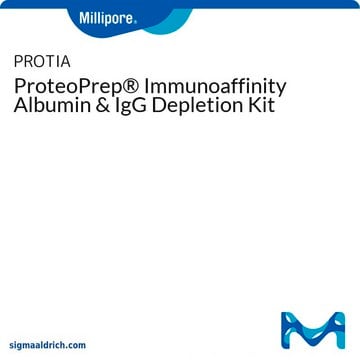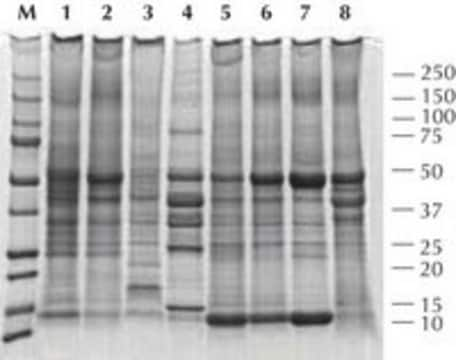Recommended Products
form
dry powder
storage temp.
2-8°C
General description
ProteoPrep® Total Extraction Sample Kit is designed to extract all proteins from any type of cell or tissue. It includes two reagents that have been used extensively for extraction and two new reagents with increased solubilizing power to extract more proteins. This kit also includes reagents for the reduction and alkylation of disulfide bonds. This allows comparison of the protein extractions obtained with each of the four reagents and optimization to meet your individual needs. The special reducing and alkylating reagents produce protein samples that exhibit improved focusing and decreased streaking in 2D gels.
Application
ProteoPrep® Total Extraction Sample Kit has been used to extract total protein from various sources such as epidermal stem cells and rheumatoid arthritis (RA) synovial fibroblasts.
Features and Benefits
- Four pre-mixed solubilization reagents - Enables rapid solubilization.
- Pre-measured reducing and alkylating reagents - Easy-to-use reagents provide improved IEF resolution.
- Innovative detergent preparations - Highly improved solubility allows higher protein loads and greater visibility of low abundance proteins in 2D gels.
Storage and Stability
These reagents should remain stable for at least 6 months in their unopened container.
Other Notes
The ProteoPrep® Total Extraction Kit was designed through a collaboration of Proteome Systems and Sigma research scientists.
This kit contains enough reagents to generate at least ten 2-ml samples using all four reagents. For researchers who have optimized an extraction protocol using one chaotropic extraction reagent, each reagent is available as an individual product as well.
This kit contains enough reagents to generate at least ten 2-ml samples using all four reagents. For researchers who have optimized an extraction protocol using one chaotropic extraction reagent, each reagent is available as an individual product as well.
Legal Information
ProteoPrep is a registered trademark of Merck KGaA, Darmstadt, Germany
Disclaimer
Samples containing high amount of salts and buffers may not work with this kit. These samples should be dialyzed prior to use. This product is for R&D use only, not for drug, household, or other uses.
Kit Components Also Available Separately
Product No.
Description
SDS
- C0481Protein Extraction Reagent Type 1SDS
- C0606Protein Extraction Reagent Type 2SDS
- C0731Protein Extraction Reagent Type 3SDS
- C0356Protein Extraction Reagent Type 4SDS
- A3221Iodoacetamide, Single use vial of 56 mg 5 x 56SDS
- T7567Tributylphosphine solution, 200 mM (in N-methyl-2-pyrrolidinone), liquid 5 x 0.5SDS
Signal Word
Danger
Hazard Statements
Precautionary Statements
Hazard Classifications
Acute Tox. 3 Oral - Aquatic Chronic 2 - Carc. 2 - Eye Dam. 1 - Repr. 1B - Resp. Sens. 1 - Skin Corr. 1A - Skin Sens. 1 - STOT SE 3
Target Organs
Respiratory system
Storage Class Code
6.1C - Combustible acute toxic Cat.3 / toxic compounds or compounds which causing chronic effects
Flash Point(F)
Not applicable
Flash Point(C)
Not applicable
Certificates of Analysis (COA)
Search for Certificates of Analysis (COA) by entering the products Lot/Batch Number. Lot and Batch Numbers can be found on a product’s label following the words ‘Lot’ or ‘Batch’.
Already Own This Product?
Find documentation for the products that you have recently purchased in the Document Library.
Customers Also Viewed
Yongfang Zhou et al.
Open life sciences, 16(1), 969-980 (2021-10-02)
The main cause of steroid-induced necrosis of femoral head (SNFH) is excessive glucocorticoid (GC) intake. The aim of this article was to investigate the role of lncRNA NEAT1 as a molecular sponge to adsorb miR-23b-3p and regulate CYP1A2 in SNFH.
Selim Ceylan et al.
Canadian journal of microbiology, 57(4), 295-302 (2011-04-16)
A gram-negative, moderately halophilic bacterium was isolated from Çamaltı Saltern area, located in the Aegean Region of Turkey. Analysis of its 16S rRNA gene sequence and physiological characteristics showed that this strain belonged to the genus Halomonas ; hence, it
Brucine inhibits TNF-a-induced HFLS-RA cell proliferation by activating the JNK signaling pathway
Tang M, et al.
Experimental and Therapeutic Medicine (2019)
Tsuyoshi Nakanishi et al.
Journal of biomolecular techniques : JBT, 18(5), 278-286 (2008-01-02)
We have developed a method for on-membrane direct identification of phosphoproteins, which are detected by a phosphate-binding tag (Phos-tag) that has an affinity to phosphate groups with a chelated Zn2+ ion. This rapid profiling approach for phosphoproteins combines chemical inkjet
Effects of porcine acellular dermal matrix
treatment on wound healing and scar formation:
Role of Jag1 expression in epidermal stem cells
treatment on wound healing and scar formation:
Role of Jag1 expression in epidermal stem cells
Chen Xiao-Dong, et al.
Organogenesis (2018)
Our team of scientists has experience in all areas of research including Life Science, Material Science, Chemical Synthesis, Chromatography, Analytical and many others.
Contact Technical Service